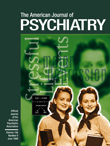Prolonged QT Interval After Trazodone Overdose
To the Editor: It is well recognized that tricyclic antidepressants, particularly in an overdose, may cause a variety of cardiac effects including QT interval prolongation on ECG (1). Newer antidepressants, including trazodone, have been associated with few cardiac side effects. The manufacturer of trazodone has received no reports of QT interval prolongation associated with trazodone at therapeutic doses or in overdose (personal communication, Mark Forest, Pharm.D., Bristol-Myers Squibb, Sept. 17, 1997). Trazodone has very rarely been associated with ventricular tachycardia (2), and there is one case report of QT prolongation and polymorphous ventricular tachycardia associated with trazodone in combination with the antiarrhythmic amiodarone (3). I report here the case of a patient who experienced significant QT prolongation after a trazodone overdose without arrhythmia or other adverse consequences.
Ms. A, a 29-year-old married woman, took an overdose of 60 units (50 mg each) of trazodone at about 9:00 p.m. and went to bed. Her normal medication regimen was fluoxetine, 40 mg every morning; trazodone, 50 mg every evening; and diazepam, 10 mg/t.i.d. as needed. She denied ingesting any other substance besides trazodone. She came to the emergency room the following morning with sedation, dizziness, and nausea. An ECG at 9:00 a.m. (12 hours after the overdose) showed sinus bradycardia (57 beats per minute), normal P-R (164 msec) and QRS (96 msec) intervals, but a prolonged corrected QT interval (607 msec) and nonspecific T-wave changes. She was treated with gastric lavage and charcoal. Cardiac monitoring over the next 30 hours showed no significant arrhythmias. An ECG given 26 hours after the overdose showed a less prolonged, corrected QT (486 msec) and the same nonspecific T-wave changes. An ECG given 3 days after the overdose showed a corrected QT of 429 msec and nonspecific T-wave changes. No pre-overdose ECG was available for comparison. Ms. A had no personal or family history of cardiac disease, syncope, or sudden death. She was taking no medication other than the psychotropic drugs. A toxicology screen was positive only for antidepressants and benzodiazepines.
Ms. A experienced an asymptomatic but significant increase in her corrected QT interval. Trazodone appears to have been the cause, given the temporal relationship to the overdose, the absence of other drugs known to prolong the QT interval, and no history to suggest a familial long QT syndrome or cardiac disease.
1. Glassman AH, Preud’homme XA: Review of the cardiovascular effects of heterocyclic antidepressants. J Clin Psychiatry 1993; 54(suppl):16–22Google Scholar
2. Vitullo RR, Wharton JM, Allen NB, Pritchett EL: Trazodone-related exercise-induced nonsustained ventricular tachycardia. Chest 1990; 98:247–248Crossref, Medline, Google Scholar
3. Mazur A, Strasberg B, Kusniec J, Sclarovsky S: QT prolongation and polymorphous ventricular tachycardia associated with trazodone-amiodarone combination. Int J Cardiol 1995; 52:27–29Crossref, Medline, Google Scholar



